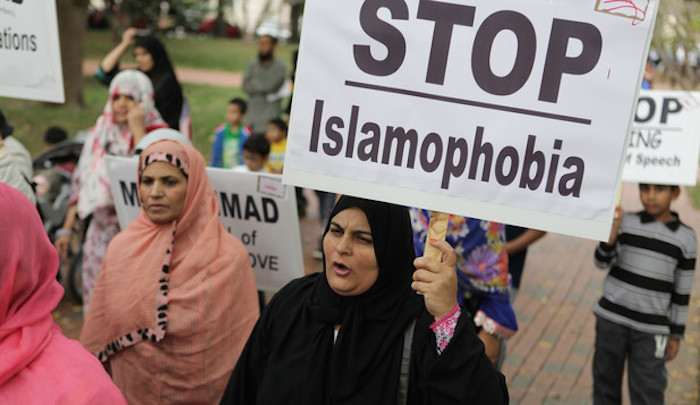www.aljazeerah.info
Opinion Editorials, January 2018
Archives
Mission & Name
Conflict Terminology
Editorials
Gaza Holocaust
Gulf War
Isdood
Islam
News
News Photos
Opinion Editorials
US Foreign Policy (Dr. El-Najjar's Articles)
www.aljazeerah.info
With an Islamophobe Becoming President, 2017 Was Another Difficult & Hard Year for American Muslims By Abdus Sattar Ghazali Al-Jazeerah, CCUN, January 4, 2018 |
 |
 |
|
2017: Another difficult & hard year for American Muslims
The seven-million American Muslims remained under siege since 9/11/2001 through reconfiguration of US laws, policies and priorities but their plight has taken a new twist under President Donald Trump whose anti-Muslim policies alarmingly fomented hate crimes against them.
The xenophobic rhetoric and anti-Muslim fear-mongering enjoys unprecedented influence with Donald Trump’s most vitriolic anti-Muslim rhetoric as typified by his election campaign declaration: “I think Islam hates us.”
Heidi Beirich, advocacy director at the Southern Poverty Law Center, says that thanks to the xenophobic rhetoric of the 2016 election and its aftermath, the country has witnessed an undeniable increase in anti-Muslim rhetoric and activity. “We know that when mainstream political officials or public figures engage in defaming populations or propagandizing against them it impacts how those populations are viewed by the public and we know it can lead to violence,” she noted.
President Trump’s anti-Muslim rhetoric is best reflected by his three video tweets in November last when he retweeted three videos supposedly depicting Muslims committing acts of violence, each captioned in a manner linking the actions with the perpetrators’ racial or religious identity. The videos originated from the Twitter feed of Jayda Fransen, an anti-Muslim activist in the UK who was recently convicted of religiously aggravated harassment. The tweets were sent to Trump’s more than 43 million followers. Jayda Fransen is the deputy leader of a British anti-immigrant fringe group, Britain First. The group’s name was shouted by an extremist who gunned down and stabbed a member of Parliament earlier this year. Britain First is a fringe political party condemned as ultranationalist and previously accused of sharing anti-Muslim conspiracy theories. The office of British Prime Minister Theresa May said that Trump was wrong to share material from a group that promotes “hateful narratives.”
The early days of Donald Trump’s presidency have been an anxious time for many Muslim Americans, according to a Pew Research Center survey released in July 2017. Overall, Muslims in the United States perceive a lot of discrimination against their religious group, are leery of Trump and think their fellow Americans do not see Islam as part of mainstream U.S. society.
Consequently, nearly two-thirds of Muslim Americans say they are dissatisfied with the way things are going in the U.S. today. And about three-quarters say Donald Trump is unfriendly toward Muslims in America.
Tellingly, half of Muslim Americans say it has become harder to be Muslim in the U.S. in recent years. And 48% say they have experienced at least one incident of discrimination in the past 12 months.
At the same time, many Muslims say they face a variety of significant challenges in making their way in American society.
Muslims who say it has become more difficult to be Muslim in the U.S. in recent years were asked to describe, in their own words, the main reasons for this. The most common responses include statements about Muslim extremists in other countries, misconceptions and stereotyping about Islam among the U.S. public, and Trump’s attitudes and policies toward Muslims.
According to another PEW Research survey of 2017, Americans view Muslims less warmer than atheists while they view more warmly the seven other religious groups mentioned in the survey (Jews, Catholics, mainline Protestants, evangelical Christians, Buddhists, Hindus and Mormons).
Even cancer has a better public image than Muslim-Americans. How did it get this bad? A study released last year by consulting firm 416Labs showed that over 25 years of coverage and headlines, the portrayal of Islam and Muslims in the New York Times was more negative than cancer, alcohol, and cocaine. The study found there are no positive words in the top 25 associations with Islam and Muslims, and only 8 percent of headlines about those subjects carried a positive connotation. Cancer fared better at 17 percent. [Foreign Policy]
Anti-Muslim industry
To borrow journalist Reed Richardson, fueled by the President’s nativist agenda and a new alliance with the alt-right, the professional anti-Muslim industry has never been stronger—or more dangerous.
Richardson argues that like the US military industrial complex, there is also anti-Islam industrial complex:
“Much like our country has a military-industrial complex comprised of various-sized defense firms competing side-by-side or, very often, working directly with and for each other to wield influence and make money under the banner of “national security,” so too is there an anti-Islam industrial complex. This Islamophobia industry likewise exhibits interwoven subsidiaries, joint ventures and lobbying groups, which enrich themselves while ostensibly promoting ideals like freedom of expression, women’s rights and, yes, national security.”
The anti-Islam and anti-Muslim industry has grown because politicians have begun to market its wares. “You and I aren’t having this conversation 10 years ago, not because these folks didn’t exist back then, they did,” said Todd Green, religion professor at Luther College and author of “The Fear of Islam: An Introduction to Islamophobia in the West.” What’s changed, Luther added, is this industry’s ability to influence and dominate the mainstream narrative about Islam in the country. And aiding and abetting this is a Republican Party that has tightened its embrace of Islamophobia as a political strategy. “Politicians instrumentalize Islamophobia now because they know it works, not because of deep-rooted convictions about Islam,” he said, adding “the 2015-16 campaign really magnified that.”
For all of the Islamophobia industry’s recent successes, none can compare to Donald Trump’s victory in the 2016 election. “He has welcomed known members of organized anti-Muslim movement into his administration in a way that is unprecedented,” said Lindsay Schubiner, advocacy director for the Chicago-based watchdog group Center for New Community. Referring to the long list of Trump’s cabinet, staff, and unofficial advisors that harbor anti-immigrant or anti-Muslim sentiments, Schubiner says Trump “is incorporating their policy ideas, wholesale, into his platform, as we’ve seen with his attempts at making the Muslim ban a policy reality.”
Encouraged by President Trump’s anti-Muslim rhetoric, on June 11, far-right activists held anti-Muslim demonstrations in at least 28 cities across the United States. The demonstrators, spurred by the ACT for America - one of the largest grass-roots anti-Muslim group - were met in many cases by larger crowds of counter protesters. Clashes reportedly broke out between anti-fascists - known colloquially as Antifa - and march participants in a handful of cities, including Seattle, Washington.
Buoyant by the June 11 demonstrations, the ACT for America, announced to hold anti-Muslim and pro-Trump rallies at around 37 locations across the country on Sept. 9 to mark the 16th anniversary of 9/11. However, the group cancelled the planned rallies apparently because of poor response from the public. The ACT for America has been labeled an extremist anti-Muslim group by the Southern Poverty Law Center, an organization that tracks hate groups.
***
Share the link of this article with your facebook friends
|
|
|
|
||
|
||||||


